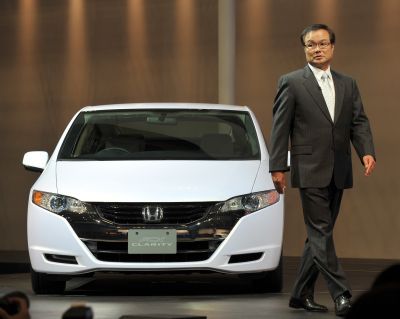Your support helps us to tell the story
From reproductive rights to climate change to Big Tech, The Independent is on the ground when the story is developing. Whether it's investigating the financials of Elon Musk's pro-Trump PAC or producing our latest documentary, 'The A Word', which shines a light on the American women fighting for reproductive rights, we know how important it is to parse out the facts from the messaging.
At such a critical moment in US history, we need reporters on the ground. Your donation allows us to keep sending journalists to speak to both sides of the story.
The Independent is trusted by Americans across the entire political spectrum. And unlike many other quality news outlets, we choose not to lock Americans out of our reporting and analysis with paywalls. We believe quality journalism should be available to everyone, paid for by those who can afford it.
Your support makes all the difference.Honda is to develop a plug-in hybrid vehicle for the US market by 2012, the company's CEO Takanobu Ito announced July 20, although he insisted that the company still believes the future of fuel cell technology is bright.
The new vehicle will be designed to compete with the plugin Prius, a rechargeable version of Toyota's phenomenally successful hybrid which is also scheduled for release in 2012.
By the end of 2010, Honda expects its plugin vehicles to be undergoing tests in California in the city of Torrance, as well as demonstrations through 2011 at Stanford University and Google.
While admitting that electic vehicles still have "some issues that need to be addressed," Honda also indicated that it expects its own full-battery electric vehicle to go on sale in Japan and the US by 2012.
As a long-time advocate of fuel cell technology, the automaker showed no signs of giving up on its goal to make hydrogen-fuelled vehicles a reality, saying that "in the long-term, fuel-cell electric vehicles will provide the ultimate mobility."
It has promised to continue work on its hydrogen fuelling systems and on the technological advancement of the FCX Clarity, a fuel-cell vehicle currently being tested by several high-profile customers (including 2010 Canadian Olympic hockey team captain Scott Niedermayer) which emits only water vapor and has a range of 385 km.
Though fuel cells are considered unrealistic by some automakers and critics, primarily due to the lack of fuelling stations, Honda has spent over seven years refining its models with customers, releasing several generations of the vehicles to be road tested in areas that have the necessary hydrogen infrastructure.
It says that with the Clarity's fuel efficiency three times that of a comparable, modern gasoline-powered automobile, its ultimate goal is to achieve "the mass-market commercialization of zero-emissions fuel cell vehicles."

Join our commenting forum
Join thought-provoking conversations, follow other Independent readers and see their replies
Comments